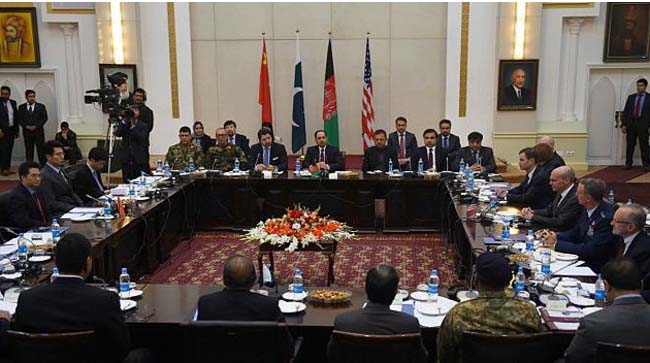Resuming reconciliation process makes the headlines on national newspapers in recent days. The Taliban’s protracted offensive and militancy, which spilled the blood of thousands of Afghan men, women and children, is beyond the public tolerance. Despite the fact that Afghan officials have been seeking to hold a heart-to-heart talk with the Taliban elements, violence and bloodshed continue unabated. On late July 2015, Pakistan hosted a talk between the Afghan government and Taliban representatives at the popular tourist resort of Murree as part of its efforts to put an end to over a decade-old conflict in the war-torn country. Senior officials from Pakistan, China and the United States also attended closed-door talks suggesting that the Murree process had the backing of all major international players. But Mullah Omar’s death, which was revealed just a day before a second meeting was supposed to take place, stalled the negotiation.
On January 18, 2016, Afghanistan, Pakistan, China and the United States held second round of talks on the Afghan peace process in Kabul. The four nations issued a joint statement following the meeting calling on the Taliban to join the peace process. The four parties also made some progress on the roadmap of peace talks between the Afghan government and the Taliban, according to the joint statement. “China supports all initiatives and measures that are conducive for the reconciliation and resumption of peace talks. This also accords with China’s security interests,” Chinese Foreign Minister Wang Yi. Wang is quoted as saying. He also said that China backs an “Afghan-led, Afghan-owned” reconciliation process and spoke highly of the resumption of peace talks between the Afghan government and the Taliban. Addressing a press conference, the Afghan Chief Executive Officer (CEO) Dr. Abdullah Abdullah said that Afghans had a strong desire for peace and stability and militants should welcome the chance since they are unable to bring down the government via terror and insurgency. “The unity government and the Afghan people have the determination to bring peace and stability and to defend the country. We are honestly and strictly in favor of sustainable peace,” he is cited as saying.
On the other hand, a source has said that Afghan Taliban want to be removed from a UN blacklist before considering rejoining peace talks aimed at ending a 15-year civil war. “We conveyed them to first remove us from the blacklist of the United Nations and allow us to freely travel around the world and then we can think about holding peace talks,” Reuters quotes a Taliban member. The Taliban also pointed out that its “political office” in Qatar has the authority to represent their will. Members of the Taliban’s unofficial Qatar office are believed to be affiliated to Mullah Akhtar Mansoor, who was appointed as the Taliban leader last year with the revelation of Mullah Omar’s death.
In addition to officials’ efforts, Afghan former Jihadi figures have also decided to broker peace talk between the government and Taliban elements – local news reports. The head of “Grand Council of Afghanistan Mujahedeen” – which was newly established to facilitate reconciliation process – said, “The Afghan government should hand over the peace campaign to former mujahedeen and religious scholars because only they can understand the words of each other.” He further said that the main goal behind the creation of the council was to bring peace and stability to the country and provide an environment for Taliban to join the Afghan government.
It is believed that the religious scholars will play an instrumental role in this regard since they are held in greater respect by the Taliban. Moreover, if this initiative had been taken earlier, it would give a fruitful result – perhaps more effective than the achievements of High Peace Council (HPC). The clergy and Ulema Council did not take a direct part in brokering peace talk within the past 14 years. This initiative must be welcomed and supported by the government. In other words, although the Taliban will continue their aggressive ideology and justify spilling the blood of those who speak against them, be it religious scholars or any other groups, the engagement of the clergy will desensitize the peace talk.
Pakistani officials have pushed for resuming peace talk. Now, they will have to nudge the Taliban to come to the negotiating table without irrational precondition, which was mentioned above. Afghan government has showed great tolerance towards the Taliban insurgents. As a result, a number of the Taliban prisoners were released during the administration of Hamid Karzai, and they were called “discontented brothers”. Hence, if the precondition – set by the Taliban – be met, there is no assurance if they practice upon their words and cease their acts of terror. Secondly, the Taliban claims that they fight on the basis of their ideology; therefore, the life of their fighters must be of no significance.
There are two choices left before warring parties: either sit around the negotiating table or will be dealt militarily. The first one will save their life and the second one threatens it. Now, it is the Taliban to choose death or life. Therefore, Dr. Abdullah says that as the door to peace is open for the Taliban, they will have to welcome this opportunity and give up violence and bloodshed since they cannot bring down the government. Let us hope that US, China and Pakistan will get the Taliban elements to resume peace talk.
Home » Opinion » Seeking Amiable Negotiation
Seeking Amiable Negotiation
| Hujjatullah Zia

